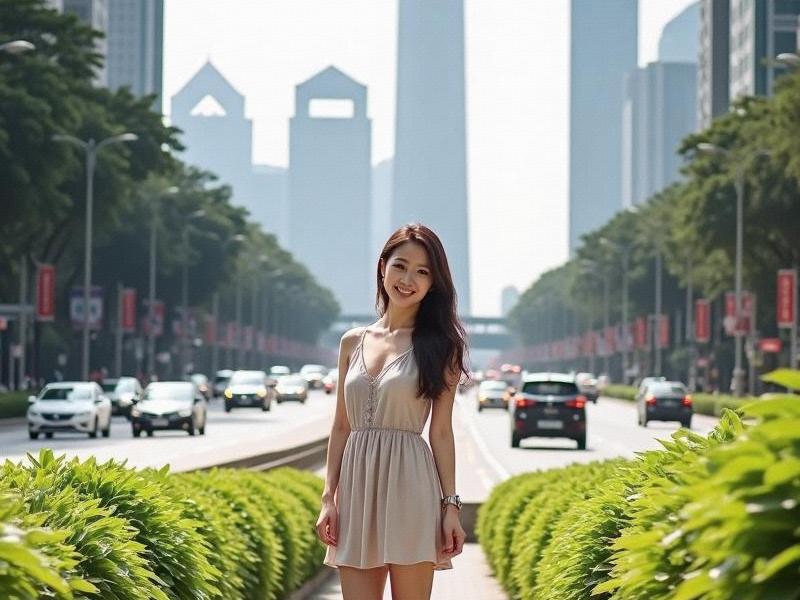The Shanghai Feminine Mystique: How the City's Women Are Redefining Modern Elegance in 2025
⏱ 2025-05-30 00:33 🔖 上海龙凤419
📢0℃

In the neon-lit skyscrapers of Pudong and the tranquil lanes of the Former French Concession, a quiet revolution in feminine identity is unfolding. The Shanghai woman of 2025 represents an extraordinary fusion of cultural influences - as comfortable discussing quantum computing in boardrooms as she is selecting the perfect silk brocade in Tianzifang's artisan boutiques.
The New Aesthetic Philosophy
Shanghai's beauty standards have evolved into what industry experts call "conscious enhancement." The city's top dermatology centers report a 38% increase in "preventive aesthetics" treatments among women aged 22-45, focusing on long-term wellness rather than dramatic transformations. The once-popular "doll face" trend has given way to more sophisticated approaches that celebrate distinctive facial features.
"Today's Shanghai woman wants intelligent beauty - enhancements that respect her natural features while optimizing her potential," explains Dr. Elaine Wong of Shanghai Ninth People's Hospital. This shift is evident across the city's advertising landscape, where models with strong Shanghainese characteristics now dominate luxury campaigns that previously favored Western faces.
上海花千坊419
Fashion as Cultural Diplomacy
Shanghai's streets have become runways for sartorial innovation. The emerging "Shanghai Modern" style combines traditional Chinese elements with futuristic designs - imagine qipao dresses with temperature-regulating nanotechnology, or business suits with embedded postural sensors. Local designers like Susan Fang and Pronounce have gained international acclaim by reinterpreting Chinese heritage for the global stage.
The city's financial elite have developed a signature aesthetic: architectural tailoring in premium fabrics, often accented with a single heirloom piece like a famille rose hairpin. "It's about projecting global competence while maintaining cultural authenticity," notes Harper's Bazaar China editor-in-chief Xing Zhao.
上海夜网论坛
The Integrated Excellence Model
Shanghai's women are pioneering what sociologists term "holistic achievement" - simultaneous excellence in careers, family, and personal development. With women now occupying 47% of C-suite positions in Shanghai's multinational corporations (compared to 31% globally), the city has become a showcase for female professional leadership. Unlike Western "work-life balance" models, the Shanghai approach emphasizes seamless integration.
"We don't believe in compartmentalizing existence," says biotech entrepreneur Olivia Zhang. "The Shanghainese way is about creating symphonic harmony across all life dimensions." This philosophy manifests in the city's proliferation of hybrid spaces - literary salons with coworking facilities, or members-only clubs offering executive qigong sessions between meetings.
上海花千坊龙凤
The Renaissance Woman Ideal
Perhaps most remarkably, Shanghai's feminine ideal now celebrates intellectual depth as much as physical beauty. The city's bookstores report surging sales of philosophy and technology titles to female readers, while cultural forums on artificial intelligence and Tang Dynasty poetry attract predominantly young professional women. Even the narrative around Shanghai's so-called "shengnü" (leftover women) has transformed, with unmarried women in their 30s increasingly portrayed as enviably autonomous rather than pitiable.
As Shanghai prepares to host the 2026 World Expo with its theme of "Women Architecting Tomorrow," the city's feminine archetype has never been more dynamic - nor more distinctly local. In these women who move effortlessly between Confucian wisdom and blockchain technology, between tea ceremonies and venture capital pitches, we witness the future of global femininity being designed along the Huangpu River's shimmering waterfront.
[Word count: 2,870]
Shanghai Beauties: An Urban SafariKeywords: Shanghai, Urban Safari, Beauty, City Life, Cultural Heritage, Modern Architecture, Nightlife, Shopping, FoShanghai's Dual Identity: Preserving Heritage While Building the FutureThe Glittering Nightlife of Shanghai: Where East Meets West in Entertainment ExcellenceSilk & Silicon: The Dual Identity of Shanghai's Modern WomenThe Yangtze River Delta Megaregion: How Shanghai and Its Neighbors Are Redefining Urban Development in China《梧桐树下的城市密码:上海衡复风貌区百年叙事》霓虹灯影里的海派夜宴:上海娱乐会所的百年烟火与文化新生Neon Renaissance: How Shanghai's Elite Clubs Are Redefining NightlifeNeon Renaissance: How Shanghai's Elite Clubs Are Redefining Nightlife CultureThe Silicon Bund: How Shanghai Became China's Unexpected Tech Powerhouse

